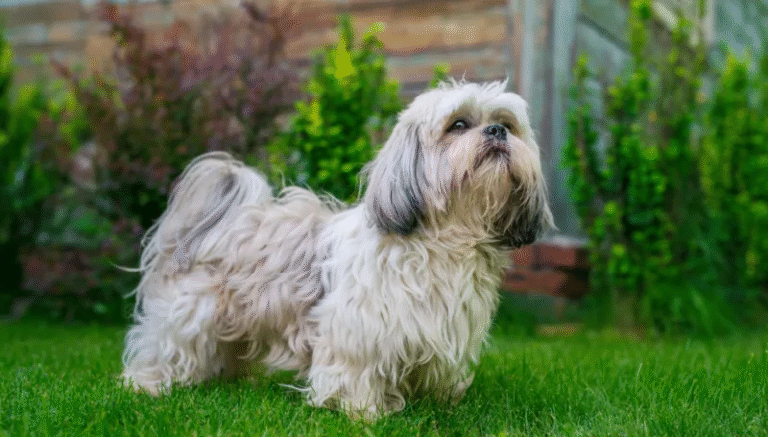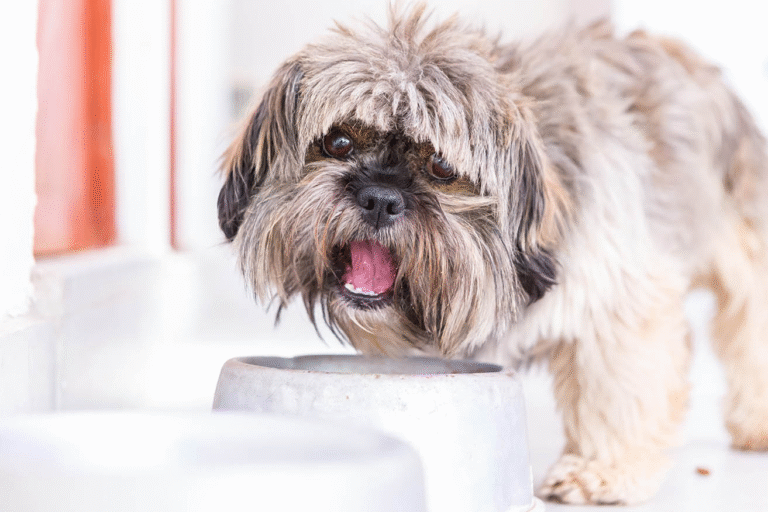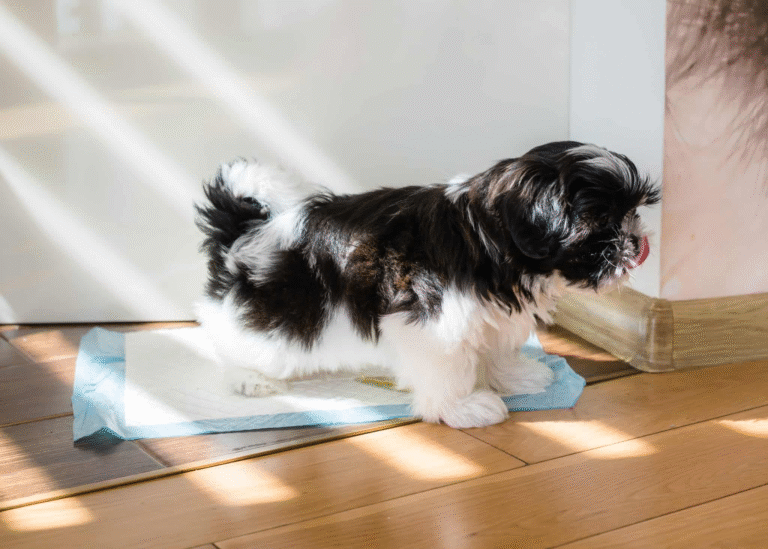Is It Normal for Shih Tzus to Breathe Fast While Resting?
Shih Tzus are well-known for their loving nature and cute looks. Sometimes their frail size and short snouts (brachycephalic traits) leave owners to wonder about them—especially their breathing. One key question Shih Tzu owners commonly ask is: “Is it normal for my Shih Tzu to be breathing fast while resting?”
In this guide, we will discuss when fast breathing is known to be normal, when it’s not, the common causes, and how to keep your Shih Tzu safe and healthy.
What Is Considered “Fast Breathing” in Shih Tzus?

Dogs take approximately 10 to 35 breaths per minute while resting or asleep. If your Shih Tzu’s normal resting or sleeping breaths is more than 40 breaths per minute, it could be classified as rapid breathing (also known as tachypnea).
To measure:
- Count the number of breaths in 15 seconds.
- Multiply by 4 to get the breaths per minute.
- Do this while your Shih Tzu is calm and resting.
When Is Fast Breathing Normal in Shih Tzus?
There are several harmless situations where fast breathing can occur in Shih Tzus:
1. After Exercise or Play
Shih Tzus naturally breathe quickly, or pant, after a walk or play session and this is normal and simply their way of cooling off. Unlike people, they cannot cool off by sweating.
2. Excitement or Mild Stress
Panting can also happen with excitement. Going in the car, seeing a person they like or anticipating a meal can all induce some quick bouts of paced breathing.
3. Warm Temperatures
In hot weather or even in warm rooms, your Shih Tzu will pant to cool their body down. Dogs with short noses like Shih Tzus are more prone to heat and will usually breathe faster than they would in the same situation with a longer nose.
4. Dreaming During Sleep (REM Phase)
Dogs also exhibit fast, shallow breathing during sleep when they are following their sleep patterns and entering the ‘dream’ good phase of sleep. They may exhibit some twitching or paw movements, or even make small whimper sounds. This is all normal.
When Fast Breathing Is Not Normal
If your Shih Tzu is breathing fast while resting and has not been active or excited recently, it could indicate a problem—especially if it happens frequently or is accompanied by other symptoms.
Signs that fast breathing may not be normal:
- Breathing appears labored or noisy
- Belly and chest moving significantly
- Gums appear pale, blue, or purple
- Coughing, gagging, or wheezing
- Loss of appetite or energy
- Shih Tzu appears restless or unable to settle
Common Causes of Abnormal Fast Breathing in Shih Tzus
Let’s take a closer look at the possible causes of abnormal rapid breathing:
1. Overheating or Heatstroke
Shih Tzus are highly prone to overheating due to their short noses and long coats. Breathing rapidly is one of the first signs that your dog may be struggling with heat.
Other symptoms: Drooling, excessive panting, red gums, weakness, vomiting.
What to do: Move your dog to a cool area, provide fresh water, and contact your vet immediately if symptoms worsen.
2. Pain or Discomfort
Dogs in pain may breathe faster, even while resting. Pain could be from an injury, dental issue, joint discomfort, or internal condition.
Look for: Whining, limping, avoiding movement, or changes in posture.
3. Anxiety or Stress
If your Shih Tzu is anxious or scared, you may notice rapid breathing, shaking, pacing, or hiding.
Common triggers: Loud noises (like fireworks or thunder), separation anxiety, or unfamiliar environments.
Solution: Provide a calm, safe space and consider calming supplements or professional behavior training.
4. Heart Disease
Heart problems can reduce oxygen flow, causing your dog to breathe more quickly to compensate.
Symptoms include: Coughing, fatigue, fainting, or swelling in the belly.
This is more common in senior Shih Tzus and requires a vet diagnosis and treatment plan.
5. Respiratory Issues (e.g. Brachycephalic Syndrome)
The Shih Tzu is a brachycephalic breed due to their short and flat noses. Therefore, they may struggle to breathe even when they are healthy. Some of them develop an obstruction to breathing called obstructive airway syndrome (BOAS) which can make it even more difficult to breathe, especially when they rest.
Watch for: Snoring, gagging, noisy breathing, or visible effort to breathe.
In some cases, surgery may be recommended to widen the airways.
6. Allergies or Infections
Respiratory infections or environmental allergies can cause inflammation, leading to rapid breathing. These are often accompanied by:
- Sneezing
- Nasal discharge
- Watery eyes
- Occasional cough
If symptoms persist, a vet can determine the cause and prescribe appropriate treatment.
7. Anemia or Low Oxygen Levels
If your dog’s blood isn’t carrying enough oxygen (due to anemia or lung issues), they may breathe faster to compensate.
Symptoms may include: Weakness, pale gums, and lethargy.
This condition always requires a vet’s attention and diagnosis.
What Should I Do if My Shih Tzu Breathes Fast While Resting?
Here are steps to take if you notice fast breathing while your Shih Tzu is resting:
1. Monitor the Breathing Rate
Count the breaths per minute and compare to the normal range (10–35 bpm). Record it to share with your vet.
2. Check the Environment
Is the room too warm? Did your dog recently get excited or exercise? If yes, wait a few minutes and check again.
3. Look for Other Symptoms
Are they acting normally otherwise? Eating, playing, drinking, and responding to you?
4. Create a Calm Space
If stress is a possible cause, reduce noise and distractions and help your Shih Tzu relax.
5. Visit the Vet if Symptoms Continue
If breathing remains fast for more than 20–30 minutes, worsens, or is paired with other symptoms, consult your veterinarian right away.
Can I Treat Fast Breathing at Home?
Only if you know the cause is minor or temporary, such as:
- Cooling your dog down in a warm room
- Comforting them during fireworks or stress
- Letting them rest after play
Do not try to medicate or diagnose at home if symptoms persist or worsen. Fast breathing can indicate serious problems, especially in brachycephalic breeds like the Shih Tzu.
How to Prevent Breathing Problems in Shih Tzus
1. Avoid Hot Weather Walks
Walk your dog early in the morning or after sunset to avoid overheating.
2. Keep Them Fit
Excess weight puts pressure on your dog’s airways and heart. Maintain a healthy diet and regular exercise.
3. Provide a Cool Environment
Use fans, cooling mats, and fresh water. Never leave a Shih Tzu in a hot car or closed room.
4. Regular Grooming
Trim excess hair around the face and keep their coat clean to avoid overheating.
5. Vet Checkups
Annual exams help catch early signs of heart, respiratory, or systemic issues that could lead to breathing problems.
Final Thoughts
Sometimes a Shih Tzu will breathe fast when relaxed, and this can be completely normal if it occurs after exercise or when it is hot. However, for certain cases the breathing will happen frequently or could last for longer than just a few minutes; or could be accompanied by other symptoms, for these situations it could be indicative of some underlying issue.
Shih Tzus are more susceptible to breathing complication than other breeds because of their flat-faced anatomy. Above all, to make sure our furry friends are healthy we can monitor the breathing, put them in a comforting environment, and enlist veterinary support as needed.
FAQs
Is fast breathing in a Shih Tzu always dangerous?
Not always. If it’s short-term and caused by heat, excitement, or dreaming, it’s usually harmless.
What is a normal breathing rate for a resting Shih Tzu?
10–35 breaths per minute. Anything over 40 while resting may need attention.
Why is my Shih Tzu breathing fast at night?
They may be dreaming or overheated. If it’s regular and includes symptoms like coughing or panting, see a vet.
Can allergies make a Shih Tzu breathe faster?
Yes. Allergies can cause nasal inflammation, leading to rapid or noisy breathing.
Should I be worried if my Shih Tzu breathes fast when sleeping?
If it only happens occasionally and lasts a few minutes, it’s likely dreaming. But consistent fast breathing during sleep may be a red flag.






